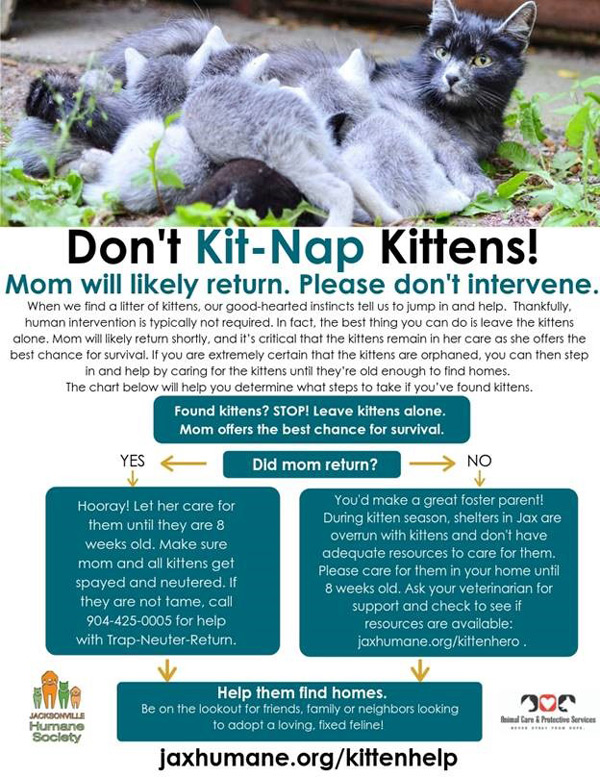JACKSONVILLE, Fla. – There's a kitten crisis on the First Coast and you can help solve it. The Jacksonville Humane Society and Animal Care and Protective Services on Friday shared advice on what you should do if you find a litter of kittens in an effort to save the felines' lives.
JHS warned against "kitnapping" after a community member found a tiny orange tabby all by himself and took him to the Humane Society. That's when staffers explained the tabby's mother was likely nearby, went back to look to see whether that was the case, and found the mother and two other kittens.
Recommended Videos
Local animals shelters are battling a kitten crisis. From January 1 to June 4, 2019, both shelters in Jacksonville – JHS and ACPS – have received 2,078 underage kittens. The last six weeks have been particularly challenging, as JHS alone received 780 kittens during that time. That is 153 more than the same timeframe as last year.
If you find a litter of kittens, your instincts may be similar -- to get help for the small animals. But, according to officials, that's called kitnapping. Instead, JHS and ACPS ask the public to follow these steps:
- Watch and wait: The mother cat is likely nearby. A kitten’s best chance of survival is to stay with its mother.
- If the mother returns: Provide support -- such as food, water and shelter -- as needed. When the kittens are 8 weeks old, get the mother and kittens spayed/neutered and find them homes.
- If the mother does not return: Officials say your house is a better option than the shelter. Ask your veterinarian for support. JHS and ACPS can coach you on providing proper care and support your efforts to find the kittens new homes.
According to JHS and ACPS, kitnapping is not good for kittens, mother cats or shelters. Underage kittens are the most fragile population in shelters and require extra time, labor and resources that are not always available. When underage kittens arrive at the shelter, they most often have to go into a foster home the very same day, putting an extra strain on staffers and volunteers. JHS reported it had more than 1,000 kittens in foster homes during June 2018. The organizations added that when no one looks for the mother cat, she is left alone to continue reproducing in the community.
"We are so appreciative of citizens who want to do the right thing by helping kittens, and the best thing is to not make them orphans," said JHS CEO Denise Deisler. "If we can share the ‘Don’t Kitnap Kittens’ message far and wide, we are giving kittens a better chance at survival."
Community members who want to help share the “Don’t Kitnap Kittens” message can go to jaxhumane.org/kittenhelp to join the Jax Cat Help Club, which receives emails on how help kittens in Jacksonville.
Volunteers are always needed to serve as foster homes to kittens. To learn more about the program, please visit jaxhumane.org/foster.

